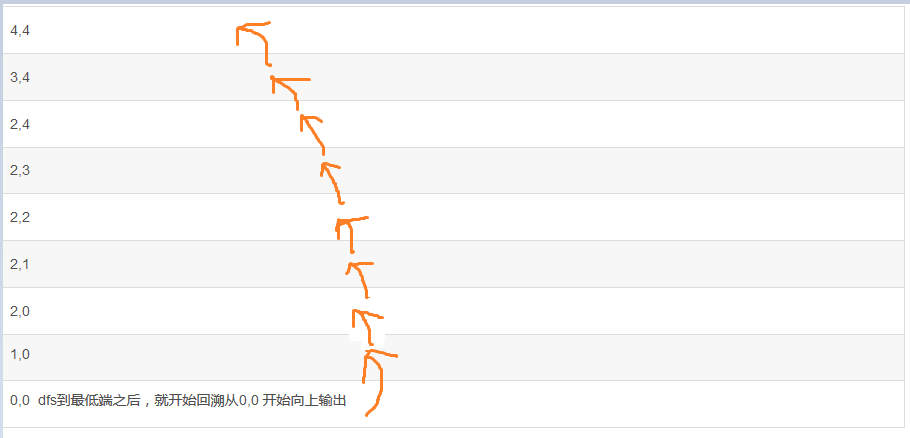K - 迷宫问题
Description
定义一个二维数组:
它表示一个迷宫,其中的1表示墙壁,0表示可以走的路,只能横着走或竖着走,不能斜着走,要求编程序找出从左上角到右下角的最短路线。
int maze[5][5] = {
0, 1, 0, 0, 0,
0, 1, 0, 1, 0,
0, 0, 0, 0, 0,
0, 1, 1, 1, 0,
0, 0, 0, 1, 0,
};
它表示一个迷宫,其中的1表示墙壁,0表示可以走的路,只能横着走或竖着走,不能斜着走,要求编程序找出从左上角到右下角的最短路线。
Input
一个5 × 5的二维数组,表示一个迷宫。数据保证有唯一解。
Output
左上角到右下角的最短路径,格式如样例所示。
Sample Input
0 1 0 0 0 0 1 0 1 0 0 0 0 0 0 0 1 1 1 0 0 0 0 1 0
Sample Output
(0, 0) (1, 0) (2, 0) (2, 1) (2, 2) (2, 3) (2, 4) (3, 4) (4, 4)
思路:这道题目非常简单,就是找出从(0,0)到(4,4)的最短路径,最短路径用bfs来求就可以了,难点在于把最短路径输出出来,这就需要dfs的回溯过程。
用bfs找到最短路径之后,v数组存放的这个路径中每一个点的前一个点的坐标,这样方便回溯的时候,把各个点输出
例如:
扫描二维码关注公众号,回复:
1108576 查看本文章


| 当前的点 | 1,0 | 2,0 | 2,1 | 2,2 | 2,3 | 2,4 | 3,4 | 4,4 |
| 存放的上一个点 | 0,0 | 1,0 | 2,0 | 2,1 | 2,2 | 2,3 | 2,4 | 3,4 |
回溯的时候就从
| 4,4 |
| 3,4 |
| 2,4 |
| 2,3 |
| 2,2 |
| 2,1 |
| 2,0 |
| 1,0 |
| 0,0 dfs到最低端之后,就开始回溯从0,0 开始向上输出 |
DFS的特点:先从最开始搜到了最底层,然后再一层一层的返回输出。
这样dfs和bfs结合,利用bfs来把最优的路径找到,利用dfs的回溯把最优的路径输出;dfs和bfs结合对于这个题目来说:完美!
AC代码
#include<stdio.h>
#include<iostream>
#include<algorithm>
#include<string.h>
#include<queue>
#include<stdlib.h>
#include<math.h>
using namespace std;
struct node
{
int x;
int y;
}v[10][10];
int mp[10][10];
int vis[10][10];
int step[10][10];
int dir[4][2]={0,1,1,0,0,-1,-1,0};
queue<node>Q;
void dfs(int x,int y)
{
if(x==0 && y==0)
{
return ;
}
dfs(v[x][y].x,v[x][y].y);
printf("(%d, %d)\n",v[x][y].x,v[x][y].y);
}
void bfs(int a,int b)
{
node last,now;
last.x=a;
last.y=b;
Q.push(last);
while(!Q.empty())
{
last=Q.front();
Q.pop();
if(last.x==4 && last.y==4)
{
dfs(last.x,last.y);
printf("(%d, %d)\n",last.x,last.y);
return ;
}
for(int i=0;i<4;i++)
{
now.x=last.x+dir[i][0];
now.y=last.y+dir[i][1];
if(now.x>=0&&now.x<=5&&now.y>=0&&now.y<=5&&mp[now.x][now.y]!=1&&vis[now.x][now.y]==0)
{
v[now.x][now.y].x=last.x;
v[now.x][now.y].y=last.y;
vis[now.x][now.y]=1;
Q.push(now);
}
}
}
}
int main()
{
for(int i=0;i<5;i++)
{
for(int j=0;j<5;j++)
{
scanf("%d",&mp[i][j]);
}
}
bfs(0,0);
return 0;
}
